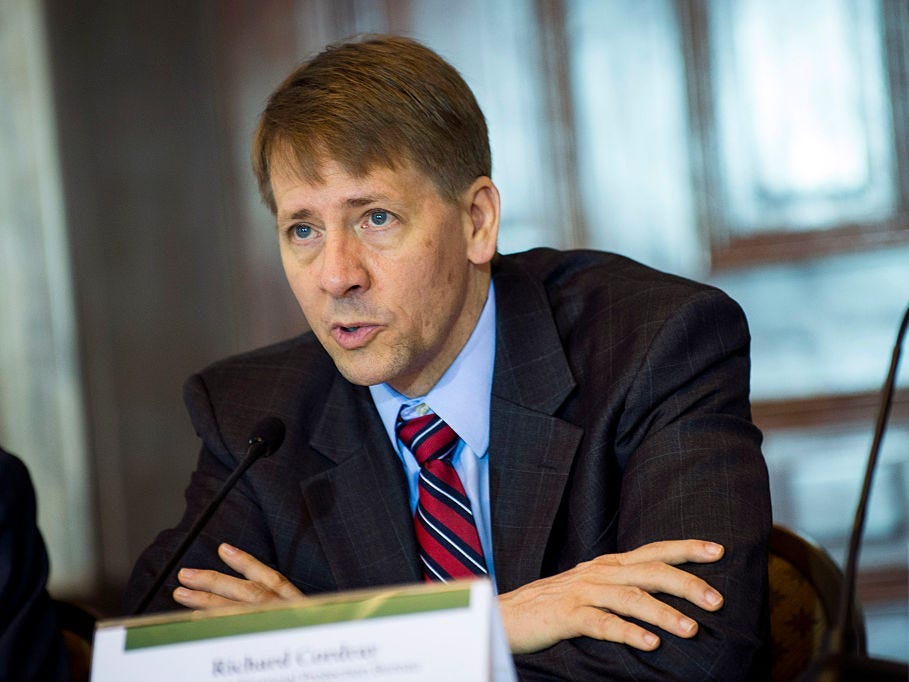
Pete Marovich/Getty Images)
- FSA head Richard Cordray vowed executives of defunct for-profits will pay the price for wrongdoing.
- In August, Rep. Bobby Scott said students and taxpayers should not have to pay the cost of failed schools.
- For-profits like ITT Tech and Corinthian misled students into taking on more debt than they could pay off.
In August, House Education Chair Bobby Scott urged the Education Department to hold the executives of defunct for-profit colleges, like Corinthian and ITT Tech, personally liable for money owed to the federal government – a cost that has typically fallen on students and taxpayers.
During a hearing last week, Federal Student Aid (FSA) director Richard Cordray directly responded to Scott's request, and he said he "absolutely" agrees.
"We see eye to eye on this," Cordray said. "We absolutely agree. More needs to be done to prevent people from abusing these student aid programs, from cheating taxpayers, from cheating students."
Cordray was invited to testify before the House Education and Labor Committee last week on his financial aid priorities, and while he was often vague in his responses to a number of questions surrounding broad student loan forgiveness, he was clear with his stance on protecting borrowers defrauded by for-profit schools.
During his line of questioning, Scott followed up on his August letter, saying that the Education Department has been "failing" to use its authority in holding the executives of institutions that defrauded students financially accountable, which has left "taxpayers and students to pay the price when institutions engage in fraudulent activities."
Cordray acknowledged Scott's letter and said "it was a good bit of a kick in the behind for us to make sure we're moving down the road on this. And we will."
Scott cited a March testimony from Dan Zibel, chief counsel of Student Defense, which detailed the department's authority to ensure exeuctives pay the price for failed for-profit schools. Last year, Student Defense, which advocates for students' rights, released a report detailing how those executives can be held accountable under the Higher Education Act.
-Student Defense (@studentlegalnet) October 27, 2021
Not only do defunct for-profits cut students' educations short, but they can often stick those students with a large debt burden that is often difficult to pay off. A series of for-profit colleges have shut down in recent years amid accusations of fraud, mismanagement, and misleading students into taking on student debt they can't pay off, and while a student-loan forgiveness program exists to forgive student debt for defrauded borrowers, under Education Secretary Betsy DeVos's policy, the program ran up a 99.4% denial rate.
That's why Education Secretary Miguel Cardona reversed that policy to start giving borrowers defrauded by for-profit schools the relief they qualify for and has canceled about $2.6 billion for borrowers defrauded by for-profit schools.
Still, lawmakers believe the institutions that forced borrowers to take on more debt than they could pay off are not facing adequate consequences. House Appropriations Chair Rosa DeLauro wrote a letter to Cardona last month saying that defunct for-profits should be fined "commensurate with the scope of the misrepresentations and wrongdoing committed by the institution."
In October 2020, Massachusetts Sen. Elizabeth Warren led five of her Democratic colleagues in pushing for the department to use all the legal tools at its disposal to hold executives of the for-profits that "defrauded students personally, financially accountable."
The lawmakers wrote the department's failure to enforce accountability "has also encouraged future lawbreaking by executives who feel confident they can enrich themselves at the expense of students and taxpayers without consequence."